Understanding Ramadan: Cultural Practices in Dubai
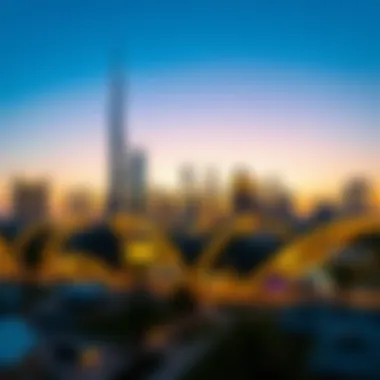
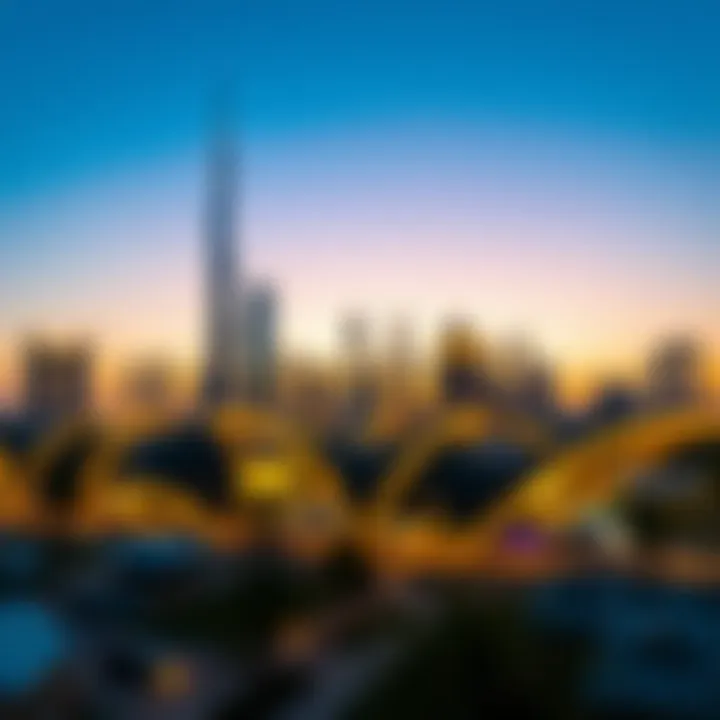
Intro
Ramadan is a month steeped in significance for millions around the world, particularly for Muslims in Dubai. It’s not just a time of fasting and prayer; it’s a period rich in traditions and a unique cultural context that shapes the dynamics of life in one of the world’s most cosmopolitan cities. From the sighting of the new moon to the sound of the Maghrib call to prayer, Ramadan is a vibrant and heartfelt experience that touches on every aspect of daily living in Dubai.
As the holy month approaches, it’s essential to understand how its observances influence the lifestyle of residents and the pulse of business activities. Not only does it present an occasion for spiritual reflection, but it also brings about changes in social interactions, humanitarian actions, and significantly, the real estate market. This transformation is particularly worth noting for investors, buyers, and property developers who operate in this dynamic emirate.
The interactions during Ramadan can set the tone for deals and investments. Many see it as a time of goodwill; thus, exclusive opportunities arise for those attuned to the nuances of cultural observances. This article aims to provide an insightful guide into the dates, cultural practices, and their implications within Dubai's real estate sector as Ramadan unfolds.
“Ramadan is about more than just abstaining from food; it’s a chance to reflect on our lifestyles and choices.”
As we unpack the layers of Ramadan, we'll delve into what makes this holy month unique to Dubai, the trends shaping the market, the interplay of religious observance and business, and how one can navigate these waters wisely in terms of real estate investments.
Preamble to Ramadan
Ramadan is not just a month in the Islamic calendar; it embodies a profound faith experience that resonates deeply with Muslim communities worldwide. In the context of Dubai, this holy month takes on an even more vibrant character. Given its unique blend of tradition and modernity, the city provides a rich backdrop for observing Ramadan. Understanding the importance of this month is pivotal for anyone navigating the cultural landscape of Dubai, whether they are investors, expatriates, or local residents.
This article aims to demystify Ramadan's practices, dates, and implications, particularly focusing on how it affects diverse aspects of life in Dubai. The rituals and customs during this period mirror the broader significance it holds for individuals and communities alike, extending far beyond mere fasting.
Historical Context
In the 7th century, the tenets of Ramadan were established following the revelation of the Quran to the Prophet Muhammad. This foundational moment not only marked the beginning of Islamic tradition but also highlighted the communal aspects of faith. Over time, a rich tapestry of rituals has developed around the month, encompassing spiritual reflection, prayer, and acts of charity.
The historical layers of Ramadan reveal a journey of adaptation and endurance, as its significance has evolved with the changing socio-economic landscapes. In places like Dubai, Ramadan meshes with the city's rapidly growing modernity, reflecting both the struggles and triumphs of its people.
Religious Significance
Ramadan serves as a time for self-correction, spiritual healing, and an opportunity for believers to strengthen their faith. Fasting, one of the five pillars of Islam, is not merely an act of abstaining from food and drink; it’s about fostering empathy for the less fortunate and cultivating a sense of unity within the community. Possessing deep-rooted significance, it invites individuals to engage in self-reflection and cultivate a renewed sense of dedication towards their beliefs.
In Dubai, these values take on an added richness. The cosmopolitan nature of the city allows for a unique convergence of cultures, making the spiritual observance more visible. Both citizens and expatriates come together for prayers, the iftar meals breaking their fast, and community gatherings, showcasing a blend of religious fervor and cultural diversity.
Whether it's joining in nightly prayers at the local mosque or sharing iftar meals with neighbors, the essence of the month transforms everyday life, fostering a community spirit. As one person stated, "It's not just about abstaining from food; it's about feeding the soul."
Thus, this introduction to Ramadan highlights the importance of understanding its historical roots and religious context. It sets the stage for exploring how the month affects contemporary practices in Dubai and how it unfolds in daily life, making it crucial for locals and visitors alike to grasp its full meaning and relevance.
Ramadan Dates in Dubai
Understanding the dates of Ramadan in Dubai is crucial not just from a religious standpoint but also for recognizing the unique rhythms that govern the lives of its residents, whether they're locals or expatriates. This holy month affects everything from daily routines to market dynamics, influencing both social and business environments. The timing of Ramadan shifts each year because it’s based on the lunar calendar, which leads to a fascinating interplay between tradition and modern life in this cosmopolitan city.
Lunar Calendar and Its Impact
The Islamic calendar is lunar, meaning its months are based on the phases of the moon. A month can last 29 or 30 days, depending on the moon sighting. As a result, Ramadan shifts approximately 10 to 12 days earlier each year when compared to the Gregorian calendar. For instance, if Ramadan starts on March 24 one year, it could begin around March 13 the following year.
This shifting can present complexities, especially in a city like Dubai, which is home to numerous cultures and backgrounds. Understanding the lunar calendar’s impact is essential for:
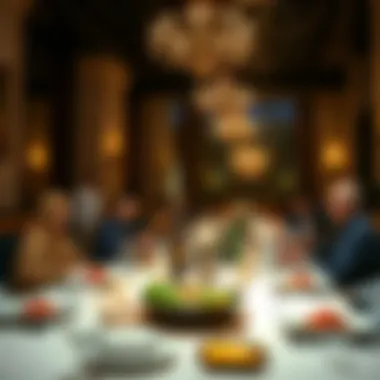

- Planning Events: Businesses, particularly in the hospitality sector, need to carefully plan around Ramadan dates to maximize their offerings, such as Iftar dinners.
- Travel Arrangements: Many expatriates and travelers adjust their plans for holidays based on Ramadan dates.
- Cultural Sensitivity: For those living in Dubai, being aware of when Ramadan falls can help them respect the local customs and practices, like fasting from dawn until dusk.
The interplay between the lunar calendar and routine adds a layer of complexity and richness to Dubai's atmosphere, making it all the more vital for investors and expatriates to recognize its significance.
Ramadan Observances in Dubai
Ramadan in Dubai is marked by various observances and traditions that illustrate the importance of this month for Muslims. While fasting is the primary observance, the month is also a time for spiritual reflection, increased prayer, and community engagement. Here are some key observations that characterize Ramadan in Dubai:
- Fasting (Sawm): From dawn until dusk, Muslims in Dubai abstain from food, drink, and other physical needs. This period of reflection is essential for nurturing empathy for the less fortunate and cultivating self-discipline.
- Iftar gatherings: At sunset, families and friends gather to break their fast. The communal nature of Iftar is vital, as individuals often share meals with neighbors or serve meals to the less fortunate, embodying the spirit of generosity and community.
- Tarawih Prayers: After the obligatory night prayers, special Tarawih prayers are held in mosques. These prayers provide an opportunity for recitation and reflection on the Quran, enhancing spiritual growth throughout the month.
- Charity and Giving: Charity is particularly emphasized during Ramadan. Many organizations, like the Dubai Charity Association, set initiatives to provide meals and support to those in need during this sacred period.
In Dubai, the observance of Ramadan encapsulates a profound sense of community and spirituality. For expatriates and investors, recognizing these aspects can foster respect and enhance relationships within the local context.
Understanding the dates and observances not only helps in navigating the social landscape during Ramadan but also opens up opportunities for community-driven business initiatives.
Overall, the significance of Ramadan dates goes beyond mere timing; they lay the groundwork for understanding Dubai's cultural fabric during this sacred month.
Cultural Practices During Ramadan
Cultural practices during Ramadan in Dubai add vibrant layers to the observance of this holy month. The ways in which people come together around shared rituals not only deepen spiritual connections but also foster community interactions. Each practice reflects the core values of the Islamic faith, while also showcasing the unique multicultural fabric of Dubai.
Iftar: Breaking the Fast
Iftar, the meal to break the fast at sunset, is more than just a time to eat; it represents the essence of community bonds in Ramadan. Families and friends often gather around the table, sharing traditional dishes like dates, lentil soup, and biryani. The breaking of the fast usually begins with the consumption of dates and water, following the Sunnah of the Prophet Muhammad. After that, hearty meals are served, and the joy of sharing food creates a sense of unity.
In Dubai, a variety of restaurants and hotels offer special Iftar buffets, drawing both locals and expatriates.
"The atmosphere during Iftar is electric. It’s not just about the food; it's about people sharing moments of gratitude and joy, creating memories that last a lifetime."
Suhoor: Pre-Dawn Meal
Before dawn, Muslims partake in Suhoor, a pre-fast meal meant to sustain them throughout the day. This meal can range from simple to elaborate dishes, featuring foods that are rich in nutrients and hydration, like yogurt, fruits, and oats. Suhoor is seen as a time for reflection and prayer, allowing individuals to set intentions for the day ahead.
In Dubai, many also host communal Suhoor events, often accompanied by discussions on spirituality and faith. Lawrence who is a local developer has mentioned how such gatherings often lead to building relationships that go beyond Ramadan, fostering professional connections as well.
Nightly Prayers and Social Gatherings
The nights during Ramadan often see a surge in prayers, especially the Taraweeh prayers, which are performed in congregation. Mosques across Dubai become hubs of spirituality as worshippers gather for these special prayers after the Isha, or the evening prayer. The sense of unity expressed through collective worship elevates the spiritual experience, drawing people closer to their faith.
Aside from prayers, social gatherings abound during Ramadan nights. It's typical to see families visiting each other or attending community events. These interactions not only fortify ties but also promote understanding among Dubai's diverse population. It’s a unique experience where you can share stories, traditions, and even recipes, thus enriching the cultural landscape of the city.
In summary, the cultural practices during Ramadan in Dubai create unique opportunities for investors, buyers, and developers to build connections while participating in the rich traditions. Ramadan offers a chance to engage with the local community, promoting goodwill and partnerships that go beyond business transactions. These practices underline the importance of community and connection, central to both Ramadan and life in Dubai.
Business Implications of Ramadan


Ramadan is not just a month of fasting and prayers; in Dubai, it plays a vital role in shaping the business landscape. The significance of Ramadan goes beyond the confines of culture and religion. For investors, buyers, agents, developers, and expatriates, understanding the intricacies of how this holy month affects business activity is essential.
Changes in Market Activity
During Ramadan, businesses often adapt their strategies to align with the values that this holy month represents. For instance, retail outlets typically experience a spike in evening shopping as people break their fast and come out for Iftar meals. This shift in consumer behavior creates ample opportunities for businesses willing to adjust to the altered shopping patterns.
- Evening Sales Surge: Stores often extend their hours and run promotions during the evening. This adjustment can lead to increased profits, especially in the food and beverage sector.
- Discounts and Promotions: Many businesses offer special discounts to draw in customers. This can help increase foot traffic and boost overall sales.
- Service Modifications: Companies may offer personalized services for Iftar gatherings or special meal packages to cater to families and communities.
The impact of these changes unleashes a domino effect on various sectors, making it essential for stakeholders to be aware of and prepared for these market dynamics.
Impact on the Real Estate Sector
The ripple effects of Ramadan are distinctly observable in the real estate sector as well.
- Rental Properties: As more expatriates and tourists come to Dubai during Ramadan, many landlords may find an increase in demand for rental properties. This is particularly true in areas where large residential communities are situated, as families seek suitable accommodations to stay close to their loved ones or religious sites.
- Commercial Spaces: There’s often a boom in demand for commercial real estate, especially related to dining establishments and social venues. Restaurants and cafes that cater to iftar begin to look for additional space to accommodate the influx of patrons.
- Investment Opportunities: Investors must keep a keen eye on market shifts. The heightened demand for properties, fueled by festive gatherings and social events, can present lucrative opportunities. New developments become attractive, especially those that incorporate cultural nuances into their design and amenities.
In essence, Ramadan can create an environment ripe with possibilities for those attuned to the seasonal shifts in the market.
“Understanding the nuances of Ramadan's effects on market dynamics is crucial for strategic planning in Dubai’s business ecosystem.”
Real Estate Trends During Ramadan
The observance of Ramadan in Dubai not only influences socio-cultural aspects but also radiates effects on the real estate market. Understanding the real estate trends during this holy month provides valuable insights for various market participants, including investors, expatriates, and property developers. The ebb and flow of demand for rental properties and the general atmosphere shape the decisions of buyers and sellers alike.
Increased Demand for Rentals
During Ramadan, the demand for rental properties tends to spike, largely fueled by expatriates and families seeking temporary accommodations. As many individuals and families from around the globe seek to experience Ramadan in a vibrant city such as Dubai, landlords often witness an uptick in inquiries and lease agreements.
The factors driving this increase include:
- Seasonal Population Surge: With numerous expatriates and foreign workers converging in Dubai for the holy month, the need for short-term rentals escalates. Families sometimes prefer spending Ramadan in the city to connect with friends and family members.
- Shorter Leases: Landlords may find that offering shorter lease terms becomes attractive as prospective tenants look to rent for the length of Ramadan specifically. This presents a significant opportunity for property owners to capitalize on a high-demand period.
- Cultural Preferences: Many people prefer renting well-located apartments close to mosques or community centers to participate fully in the observances and social gatherings that characterize the month.
This trend not only benefits landlords but also provides tenants access to luxurious amenities and communal practices, enhancing their experience of the holy month.
"Ramadan transforms the rental landscape, making it an opportune time for both tenants seeking homes and landlords aiming to optimize yields."
Investing in Ramadan: Opportunities and Challenges
Investing during Ramadan poses its own unique set of opportunities and challenges, often framed by the interplay of demand fluctuations and local sentiment. For property investors looking to navigate this period, some key considerations include:
- Market Sensitivity: Investors should recognize that purchasing behavior can change because of the spiritual atmosphere. Buyers might be more hesitant to make major decisions during this reflective month, emphasizing the need for patience in negotiations.
- Community Initiatives: Many investment opportunities emerge from community-centric projects designed to enhance social welfare during Ramadan. Investors might consider involvement in charitable developments, such as affordable housing or community centers, which resonate with the spirit of giving during this time.
- Long-Term View: Those eyeing long-term gains may find that purchasing during Ramadan can yield significant returns post-holiday, as demand in the broader property market typically rebounds. This reinforces the importance of a strategic outlook when engaging with the market.
Ultimately, understanding both the cultural significance of Ramadan and its impact on real estate enables stakeholders to make informed decisions, shaping not only their investments but also the communities in which they operate.
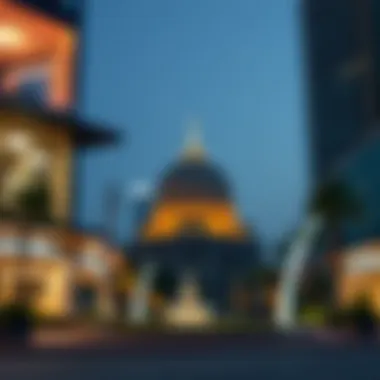
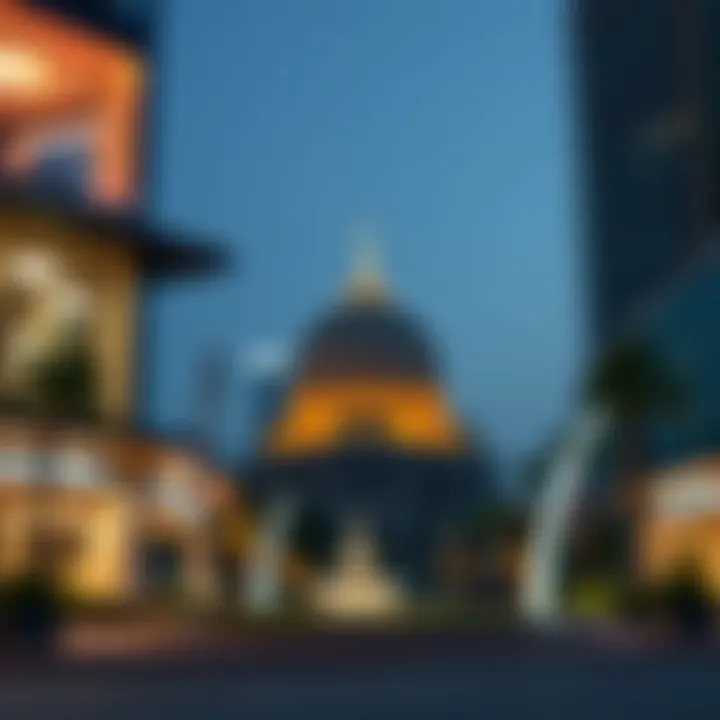
As the landscape of real estate continues to evolve, keeping an eye on these trends will be essential for those looking to capitalize on one of the most dynamic times in Dubai's yearly calendar.
Community Engagement and Charitable Acts
Community engagement and charitable acts during Ramadan are not merely traditional practices; they are vital aspects that reflect the essence of the holy month in Dubai. This period encourages social responsibility and active participation in community welfare. It serves as a reminder for Muslims and non-Muslims alike to give back and support the less fortunate, emphasizing compassion and empathy, which resonate deeply in a cosmopolitan city like Dubai.
One of the cornerstones of engaging the community during Ramadan is the promotion of charitable activities. Philanthropy often takes center stage, allowing individuals and organizations to contribute meaningfully to their locales. Many charities ramp up their operations during this time, creating various initiatives aimed at alleviating poverty, supporting education, and providing essential services to those in need.
In Dubai, the ethos of giving is encapsulated in Zakat, one of the five pillars of Islam, which mandates Muslims to donate a portion of their wealth. The significance of Zakat extends beyond mere financial aid; it promotes economic equality and fosters a sense of community among residents. Several organizations in Dubai, such as the Dubai Community Development Authority and various NGOs, actively facilitate Zakat collections and distributions, helping to ensure that aid reaches the right people.
Philanthropic Initiatives in Dubai
Numerous philanthropic initiatives thrive during the Ramadan season in Dubai. Various non-profits and community groups mobilize resources to address a host of social issues.
- Iftar Programs: Many organizations host Iftar gatherings, where meals are provided to those who are fasting, fostering a spirit of togetherness and inclusivity. For instance, the Dubai Food Festival often collaborates with local businesses to provide free meals to those in need.
- Clothing Drives: There’s often a surge in clothing donation drives aimed at providing essential clothing and necessities to vulnerable populations. Local mosques and community centers frequently serve as collection points.
- Educational Support: Initiatives aimed at supporting education are also common. Scholarships and free tutoring programs are often offered to underprivileged students, ensuring that they have opportunities despite financial constraints.
Many businesses also participate by donating a percentage of their profits to charity, aligning their corporate social responsibility initiatives with the spirit of Ramadan. This not only aids in community development but also builds goodwill, which can enhance brand loyalty among consumers.
Impact on Local Communities
The positive impact of these charitable acts penetrates beyond mere financial assistance. Community engagement and charitable initiatives bring about holistic development within local communities durin Ramadan.
- Enhanced Social Cohesion: As people unite to support one another, relationships among community members deepen. This social fabric strengthens the overall sense of belonging and cultural pride, especially in a diverse city like Dubai.
- Empowerment of the Marginalized: These acts often empower marginalized groups, giving them access to resources and support networks they might otherwise lack. This can lead to improved standards of living and a sense of dignity.
- Increased Awareness: Initiatives raise awareness about social issues, prompting informed discussions among residents. This can lead to long-term solutions and collaborations within the community.
The End: The Essence of Ramadan in Dubai
As the holy month of Ramadan draws to a close each year, it leaves a noteworthy imprint on the social, cultural, and economic fabric of Dubai. The significance of this month transcends mere fasting; it is a profound period of reflection, unity, and renewal of faith. Those living in this vibrant emirate, whether locals or expatriates, engage in practices that fortify community ties and instill a sense of belonging.
In the context of this article, understanding the essence of Ramadan in Dubai is essential for multiple reasons. First, it highlights the rich tapestry of cultural diversity that shapes the city. Individuals from various corners of the globe come together, sharing their unique customs while respecting the traditions of Islam. Second, it reveals how observance of Ramadan influences business practices. For investors and developers, recognizing the increased demand for specific sectors, such as food services and hospitality, is critical to making informed decisions.
Moreover, Ramadan presents an opportunity for exponential growth in charitable endeavors, showcasing the commitment of the UAE to community welfare. Its philanthropic nature encourages contributions to those in need, a hallmark of this observance, fostering a collaborative spirit among businesses and residents alike.
Beyond the tangible benefits, Ramadan embodies values of compassion, generosity, and community. People often reflect on their blessings and seek to help others, enhancing the spirit of togetherness. As Dubai continues to evolve, the cultural practices surrounding Ramadan will remain a cornerstone of its identity.
"Ramadan is a time to purify the soul, refocus attention on God, and practice self-discipline."
Reflections on Community and Faith
The interweaving of faith and community during Ramadan offers a unique glimpse into the essence of shared values. Each evening iftar serves not just as a meal but as a communal affair that fosters connection. Families and friends gather to break their fast together, sharing a moment of gratitude and fellowship. This sense of unity extends into neighborhoods where communal dining events often take place.
In Dubai, religious sites see increased attendance during Ramadan, as individuals from different walks of life come together for prayers and community engagements. These gatherings do not just serve as a reminder of faith but also as an avenue for fostering friendships and alliances that can transcend the boundaries of business.
Future Perspectives on Ramadan and Real Estate
Looking ahead, the future of Ramadan’s influence on real estate in Dubai is promising. As the city continues to attract a diverse population, the integration of Ramadan into the real estate market will likely become more sophisticated. For instance, developers could create residential spaces that accommodate Ramadan practices, like dedicated prayer areas or even community halls for conducting iftar meals.
Furthermore, market fluctuations during Ramadan could present new avenues for investment. Seasonal demand for rentals might surmount even the annual standards in some cases, especially for properties that offer proximity to cultural landmarks. Adapting strategies to cater to both local and international tenants will be key in navigating this period.
Real estate strategies that consider the observance of Ramadan will offer unique advantages. Investors who plan effectively will find themselves ahead of the curve, securing not just properties but also enriching community dynamics that align with the values celebrated during this holy month.
As time moves forward, being attuned to the spirit of Ramadan in Dubai will be essential for anyone looking to thrive in its ever-evolving landscape.







